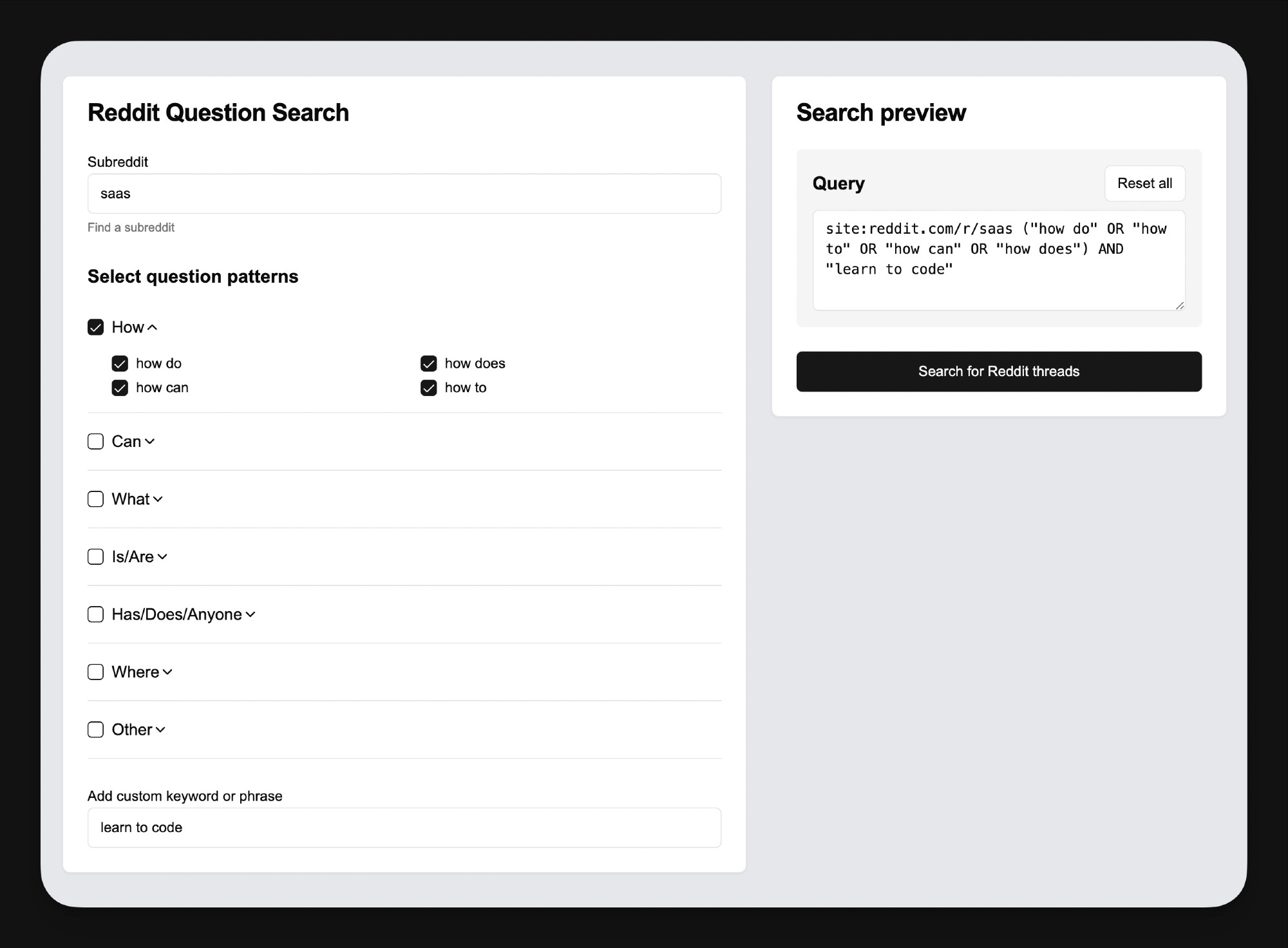How to find "shut up and take my money" problems using Reddit
"Looks interesting, but I wouldn't pay for it."
If you're building products, you've probably heard some version of this soul-crushing feedback. You spend weeks or months crafting what you think is the solution, only to discover you're solving a problem that's just... meh.
It’s not painful enough.
It’s not urgent enough.
It’s not "I would give my left leg for this to exist" enough.
Many of us get stuck in this cycle: promising ideas that end in polite nods and zero wallet-out moments. And it's not because you don't understand your market.
The real insight? Most valuable problems aren't hiding where we typically look. Those casual customer conversations and surface-level forum scrolls? They're giving you sanitized feedback, missing the raw, unfiltered pain that drives people to actually pull your product into their lives instead of you having to push so much.
Lucky for you, I've got a shortcut: Reddit. But not the way most people use it.
The reason why we tend to find lukewarm problems is because we only look at popular posts or run basic keyword searches. Whereas the real stuff gets buried in the messy, emotional conversations happening in less obvious places.
In this guide, I'll show you exactly how to find those "shut up and take my money" problems hiding in Reddit threads. You'll learn how to:
- Find real pain in 30 minutes using Reddit Question Search
- Identify clear signals that you've found a burning problem
- Test your findings across multiple communities
- Decide in 60 minutes: pursue or pivot
Let's turn your next idea from "meh, maybe" into a "must-have."
Part 1: Find real pain in 30 minutes
Before you spend weeks building something nobody wants, let's quickly validate if your problem is worth solving. We're looking for evidence of active struggle—people typing out detailed problems at 2 AM because they're desperate for a solution.
- Start with action words
The secret to finding real pain points? Search for verbs, not nouns. Don't search for "CRM" or "email tool"—search for what people are trying to do. Why? Because frustrated people describe their problems in terms of actions they're struggling with.
For sales:
- "follow up" (not "CRM")
- "cold email" (not "email software")
- "track leads" (not "pipeline tool")
- "schedule meetings" (not "calendar app")
For fitness:
- "meal prep"
- "track workouts"
- "count macros"
- "plan routine"
For content creators:
- "edit video"
- "schedule posts"
- "find hashtags"
- "grow audience"
Quick tip: List out 3-4 key actions people take in your field. The more specific the action, the better your chances of finding real struggles.
- Dig for pain using Reddit question search
Here's where we get tactical. I built Reddit Question Search because traditional Reddit search misses the gold: desperate questions buried under memes and success stories. This tool specifically surfaces people asking for help—the moments when they're most honest about their struggles.

Head to Reddit Question Search and:
- Enter your target subreddit or click “find a subreddit” to pull up anvaka’s map of reddit.
- Type in keywords related to your suspected problem
- Select question patterns like "How" and "What"
- Run a quick pain assessment
Open up the titles and ask yourself:
- Are people writing long, detailed descriptions of their struggle?
- Do they mention trying multiple solutions that failed?
- Is there evidence they're already spending money trying to fix this?
- Are they actively engaging in the comments, desperate for answers?
If you can't find at least 3-4 threads showing these signals within 30 minutes, your problem might not be painful enough.
Let me show you exactly how this works with a real example.
When we were starting up midfunnel.com, I had a hunch that sales teams struggled with follow-ups, but I didn't have easy access to salespeople to interview. So I:
- Went to the Reddit Question Search tool
- Entered "r/sales" as my subreddit
- Typed in "follow up" as my keyword
- Hit search
The results? Pages and pages of detailed struggles like:
- "How do you follow up with prospects in the middle of the sales process?" (20 comments, 25 upvotes)
- "What’s a better post price quote follow up than “hi just following up”??" (86 comments, 32 upvotes)
- “How do YOU track your follow ups?" (9 comments, 3 upvotes)
Look at the engagement on these posts. People aren't just complaining—they're sharing detailed stories, describing their cobbled-together solutions, and actively debating approaches in the comments. That's exactly what you want to see.
Part 2: Confirm you’ve found G-O-L-D (not fool’s gold)
Found some promising signals? Great. Now let's spend 30 minutes making sure this is a real opportunity, not just an isolated pain point.
- Map the problem space
First, dig deeper into those threads you found:
- What DIY solutions are people cobbling together?
- Which paid tools have they tried and abandoned? (And why?)
- How much are they currently spending to solve this?
- What specific impact is this problem having? (Look for mentions of time lost, opportunities missed, or stress caused)
- Test across communities
Next, validate that this isn't just one group's problem:
- Run the same search in 2-3 related subreddits
- Watch how the problem manifests in different contexts
- Look for common patterns in how people describe their pain
Here's how this played out with our follow-up problem:
- I took the same "follow up" keyword to r/agency
- Found agency owners describing similar struggles but from a different angle
- Discovered how follow-up problems affect both agency sales teams and client communication
- This showed us the problem wasn't just for individual salespeople—it was hurting entire businesses
This cross-community validation confirmed we weren't just seeing isolated pain—we'd found a problem that cuts across different business contexts.
The goal isn't to find every example—it's to confirm you've found a real pain point worth solving.
Your 60-minute decision point
By now, you should have spent:
- 30 minutes finding initial evidence
- 30 minutes validating across communities
Time to make the call. Here's what success looks like:
✅ Green lights (pursue the idea):
- Found 3+ detailed problem descriptions
- Seeing similar patterns across different communities
- People are actively spending money trying to solve this
- Multiple failed solution attempts mentioned
🚫 Red flags (time to pivot):
- Only finding brief mentions or casual complaints
- Problem only appears in one isolated community
- People aren't actively seeking solutions
- Few or no mentions of existing solutions tried
If you're seeing red flags, don't force it. The beauty of this method is how quickly it lets you validate or invalidate ideas. Better to spend 60 minutes finding out now than weeks building something nobody wants.
Don’t forget to check out part 1 of this guide on finding where your audience hangs out online. It'll help you pick the perfect subreddits to start with.
And part 3 - analyzing your audience to get confident you're building something people will pay for.
